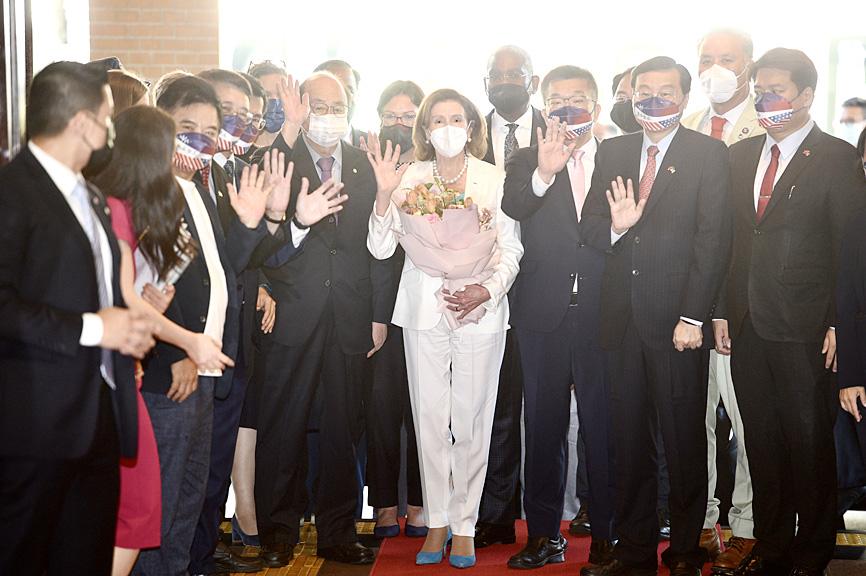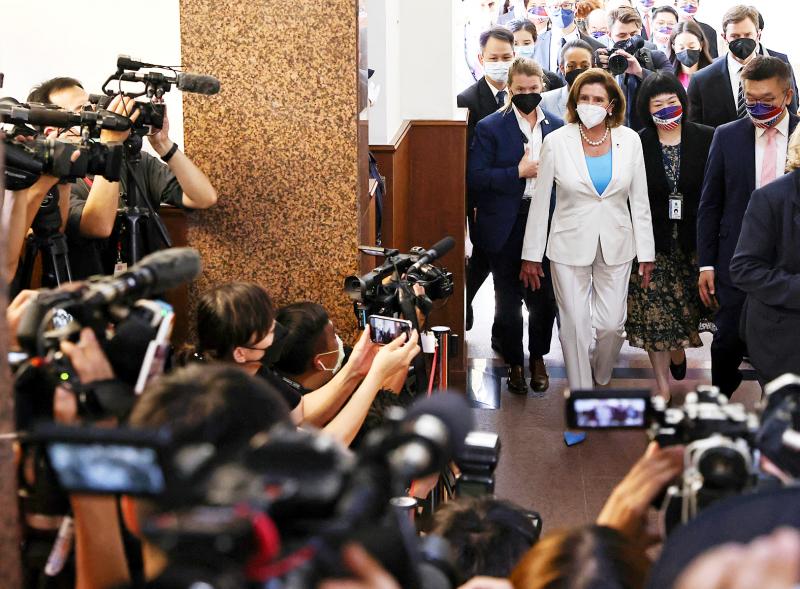The passage of the draft “creating helpful incentives to produce semiconductors (CHIPS) and science act” in the US Congress last month was a recognition of the common interests between Taiwan and the US, and opens the door for better economic exchanges between the two countries, US House of Representatives Speaker Nancy Pelosi told reporters yesterday.
The 82-year-old Democrat, who is the highest-ranking US official to visit Taiwan in 25 years, arrived at Taipei International Airport (Songshan airport) on Tuesday night.
“At the same time that the trip is taking place, we have passed the CHIPS for America act in recognition of our common economic interests,” she told a news conference after a meeting with President Tsai Ing-wen (蔡英文).

Lo Pei-de, Taipei Times
Asked whether she can promise any concrete and tangible benefits that would offset the cost of her trip that Taiwanese are expected to pay in the coming weeks, Pelosi said: “This is something that opens the doors for us for better economic exchanges. Several Taiwanese companies are already planning to invest in chip manufacturing in the US. The entrepreneurial spirit, the intellectual resources and the success of the tech industry in Taiwan has really been a model... With the CHIPS act, we are facilitating to reach our shared goal of increasing our partnership.”
Pelosi said that “a trade agreement might be possible and could occur soon,” without giving any details.
Pelosi yesterday also visited the Legislative Yuan and held a closed-door meeting with Deputy Legislative Speaker Tsai Chi-chang (蔡其昌) and the legislative caucus whips of four political parties.

Photo: Ann Wang, REUTERS
Legislative Yuan President You Si-kun (游錫堃), who could not meet with Pelosi in person after testing positive for COVID-19, spoke with her via videoconference.
Taiwan has become a beacon of democracy for the Chinese-speaking parts of the world after three peaceful transitions of power over the past two decades, You wrote on Facebook.
He praised Pelosi for leading a delegation to Taiwan despite the intimidation from China, adding that this showed the world that Taiwan-US relations are rock solid, and that Taiwan would not be alone in defending democracy.
Taiwan’s People Party (TPP) caucus whip Andy Chiu (邱臣遠) said he told Pelosi that the two sides should quickly sign a trade agreement.
Taiwan and the US “need to tackle inflation, labor shortages and issues related to supply chains with concrete actions,” he said.
Pelosi and the caucus whips also exchanged views on the National Security Law Beijing imposed in Hong Kong and the Comprehensive and Progressive Agreement for Trans-Pacific Partnership (CPTPP), he said.
New Power Party caucus whip Chiu Hsien-chih (邱顯智) told reporters that they discussed human rights issues.
Pelosi holds the view that human rights and security are two sides of the same coin, and must be considered together, Chiu Hsien-chih said.
Pelosi and the caucus whips also discussed the situations in Tibet, Xinjiang and Hong Kong, as well as the plight of human rights lawyers and non-governmental organization employees in China, he said.
They also talked about differences between Taiwan and China, such as the ability of Taiwanese human rights lawyers to not only participate in elections, but hold public office, Chiu Hsien-chih added.
Additional reporting by Huang Ching-hsuan

Taiwan is to commence mass production of the Tien Kung (天弓, “Sky Bow”) III, IV and V missiles by the second quarter of this year if the legislature approves the government’s NT$1.25 trillion (US$39.78 billion) special defense budget, an official said yesterday. Commenting on condition of anonymity, a defense official with knowledge of the matter said that the advanced systems are expected to provide crucial capabilities against ballistic and cruise missiles for the proposed “T-Dome,” an advanced, multi-layered air defense network. The Tien Kung III is an air defense missile with a maximum interception altitude of 35km. The Tien Kung IV and V

The disruption of 941 flights in and out of Taiwan due to China’s large-scale military exercises was no accident, but rather the result of a “quasi-blockade” used to simulate creating the air and sea routes needed for an amphibious landing, a military expert said. The disruptions occurred on Tuesday and lasted about 10 hours as China conducted live-fire drills in the Taiwan Strait. The Civil Aviation Administration (CAA) said the exercises affected 857 international flights and 84 domestic flights, affecting more than 100,000 travelers. Su Tzu-yun (蘇紫雲), a research fellow at the government-sponsored Institute for National Defense and Security Research, said the air

Taiwan lacks effective and cost-efficient armaments to intercept rockets, making the planned “T-Dome” interception system necessary, two experts said on Tuesday. The concerns were raised after China’s military fired two waves of rockets during live-fire drills around Taiwan on Tuesday, part of two-day exercises code-named “Justice Mission 2025.” The first wave involved 17 rockets launched at 9am from Pingtan in China’s Fujian Province, according to Lieutenant General Hsieh Jih-sheng (謝日升) of the Office of the Deputy Chief of the General Staff for Intelligence at the Ministry of National Defense. Those rockets landed 70 nautical miles (129.6km) northeast of Keelung without flying over Taiwan,

A strong continental cold air mass is to bring pollutants to Taiwan from tomorrow, the Ministry of Environment said today, as it issued an “orange” air quality alert for most of the country. All of Taiwan except for Hualien and Taitung counties is to be under an “orange” air quality alert tomorrow, indicating air quality that is unhealthy for sensitive groups. In China, areas from Shandong to Shanghai have been enveloped in haze since Saturday, the ministry said in a news release. Yesterday, hourly concentrations of PM2.5 in these areas ranged from 65 to 160 micrograms per cubic meter (mg/m³), and pollutants were